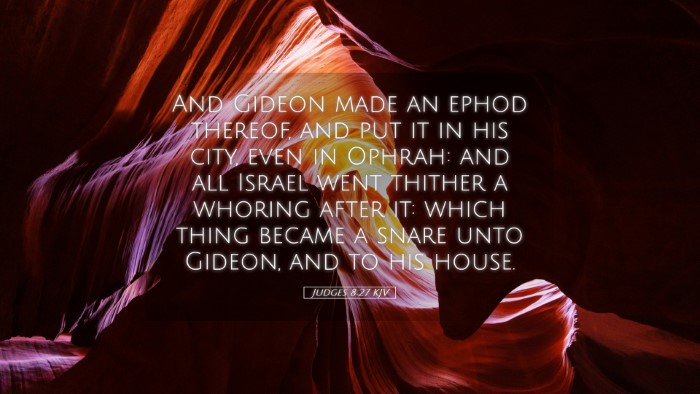Bible Commentary on Judges 8:27
Verse Reference: Judges 8:27 - "And Gideon made an ephod thereof, and put it in his city, even in Ophrah: and all Israel went thither a whoring after it: which thing became a snare unto Gideon, and to his house."
Contextual Setting
The narrative in the Book of Judges depicts a tumultuous period in Israel's history, characterized by cycles of sin, oppression, repentance, and deliverance. Gideon, whose name means “hewer” or “feller,” was chosen of God to deliver Israel from the Midianites. After a significant victory, Gideon’s subsequent actions, particularly the making of the ephod, raise critical theological and ethical questions.
Commentary Insights
Gideon’s Leadership
Matthew Henry discusses that after Gideon defeated the Midianites, he sought to solidify his leadership among the people. Although shown great courage, Gideon's decision to create an ephod could be seen as an attempt to establish a religious symbol reflecting his victory. This reflects a desire for legitimacy but also a potential drift away from the pure worship of God.
The Ephod: Symbolism and Theology
Albert Barnes comments on the significance of the ephod in Israelite culture. Originally, the ephod was a priestly garment associated with divination and worship. Gideon’s creation of an ephod signifies a blending of religious artifact with personal ambition. The action indicates a transition from divine leadership to human religious artifacts that could lead Israel into further corruption.
The Allure of Idolatry
In Adam Clarke's exposition, the danger of idolatry is emphasized. The text indicates that the people "went a whoring" after the ephod, illustrating the spiritual unfaithfulness of Israel. This phrase signifies the infidelity of Israel to Yahweh, portraying their attraction to a physical representation of divinity rather than the living God. This action leads to moral and spiritual decline, emphasizing the perennial struggle between true worship and idolatrous tendencies among God’s people.
Theological Implications
Verse 27 serves as a sobering reminder of the potential results of turning to physical representations in worship. Henry states that Gideon's actions ultimately became a "snare" not only to himself but also to his household, demonstrating how leadership decisions can have far-reaching effects. This points to the extensive consequences of mixing faith with idolatrous practices.
A Snare and Consequence
This relationship between Gideon’s actions and the ensuing consequences brings forth practical lessons. Barnes notes that the "snare" represents spiritual entrapment. The people, having once experienced a deliverer in Gideon, now allowed their faith to be misdirected into idolatry. As pastors and theologians reflect on this, the passage serves as a cautionary tale about the importance of true worship and the purity of religious leadership.
Expository Themes
- Human Imperfection: Gideon, though a judge and deliverer, displayed human flaws in his leadership.
- Power and Responsibility: With great power comes the responsibility to uphold God's commands faithfully.
- The Dangers of Idolatry: The pursuit of idols reflects deeper issues of loyalty and faithfulness.
- The Impact on Others: Individuals in leadership positions must recognize the influence of their actions on their community.
Conclusion
Judges 8:27 prompts a critical reflection on the nature of leadership, worship, and community fidelity to God. As Clarke highlights, the repercussions of idolatry are not isolated; they resound through generations. In study and practice, penitential reflection on idolatry, human impulse, and the tendency to conflate divine authority with human artifacts remains pertinent to all who seek to lead or follow in faith.


